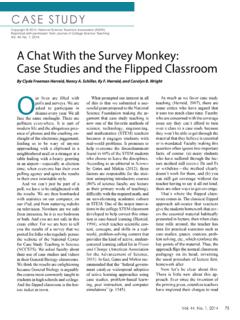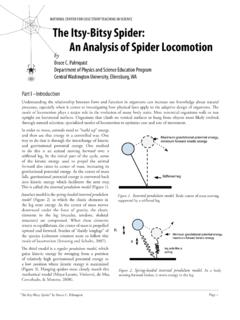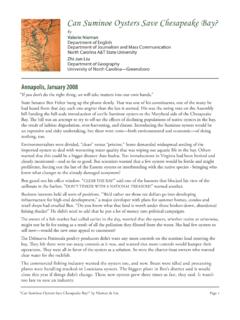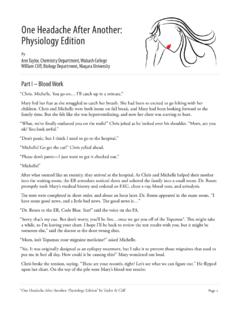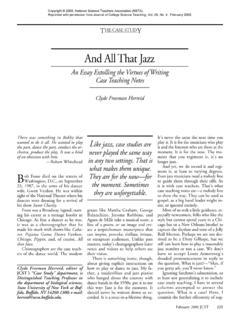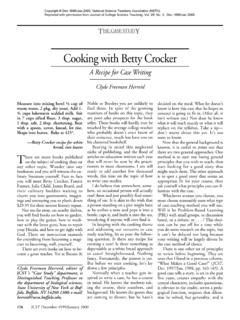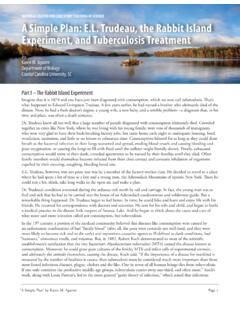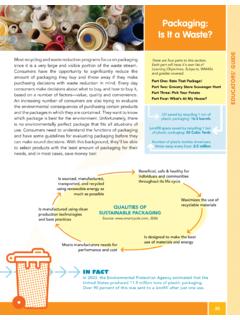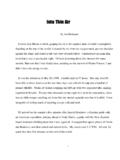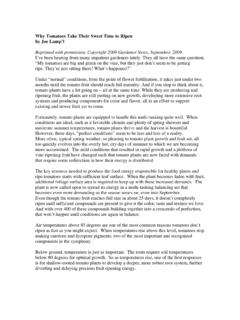Transcription of The Wealth of Water: The Value of an Essential Resource
1 The Wealth of water : The Value of an Essential Resource by Melanie K. Rathburn and Karina J. Baum Division of Natural Sciences, College of General Studies Boston University Part I Spring Break After a long semester, Paul felt like he deserved a break. When his friend Sarah mentioned that she was traveling to Bolivia over spring break, he decided to go along. He had been taking Spanish as one of his courses at the university and thought this would be his chance to use his new language skills and to learn about a di erent culture. After reading a bunch of travel guides, they decided to start their trip in Cochabamba. The city is known for having a warm climate, excellent restaurants, the largest and most exciting market in Bolivia, and a vibrant nightlife. So they booked their tickets and o . they went. When they arrived, the people were friendly and hospitable, the food was incredible (a bit spicy, but great!)
2 , and the sights were unlike anything they had seen before. It was turning out to be a fantastic trip. One night at a caf , Paul and Sarah ended up sitting at a table next to a group of Cochabambino university students. In his broken Spanish, Paul decided to strike up a conversation. They discussed all the great places to see in Bolivia. Sarah mentioned that she didn't want to just see the sights, but wanted to experience the culture of the region. Upon hearing this, one of the students, Maria, told them that the best way to learn about the people was to live with them. Maria invited Paul and Sarah to spend the weekend with her family. They jumped at the chance, and immediately checked out of their hotel. The next morning, Sarah awoke to the smell of fresh baked bread. She was so excited to start this new stage of their travels. She decided to take a quick shower before she headed down for breakfast.
3 It was so nice to be in such a welcoming home; it made Sarah think about her own family back in the United States. As she was showering, she heard a knock on the door. Are you almost done in the shower? Maria asked. I just need ve more minutes, Sarah responded. Maria returned downstairs and told everyone that Sarah would need another ve minutes. Five minutes it's probably going to be another half an hour Paul said jokingly. Although Maria turned with a smile, Paul noticed the look of concern that passed between Maria and her mother. The Wealth of water by Rathburn and Baum Page . Is anything wrong? Paul asked. No, it's just that fresh water is limited in Bolivia, our delivery system is in disrepair and the little water we do receive is lost through leaks and rusty pipes. We have to be pretty careful with our water use.. Why doesn't anyone x it?
4 Didn't you hear what happened when our government tried to sell the public water system? . Paul nodded his head no as Maria began to tell him the story. Cochabamba's economic prosperity relied on the mining industry. When this industry collapsed in the mid- s, there was no money to maintain the city's water system. The government felt that to deal with the problem they needed to privatize Cochabamba's public water supply and so they sold it to the multinational company, Bechtel. This privatization resulted in a dramatic increase in the cost of water . In Bolivia, many people live on less than $ per month. With the new water rates, people were forced to choose between paying for water and feeding their families. For you to really understand what happened during the water crisis, why don't you read this article? . Sarah came down the stairs and joined Paul and Maria as they sat down to read.
5 LEASING THE RAIN: The world is running out of fresh water , and the fight to control it has begun. In April of 2000, in the central plaza of the beautiful old Andean city of Cochabamba, Bolivia, the body of V ctor Hugo Daza lay on a makeshift bier. Daza, a seventeen-year-old student, had been shot in the face by the Army during protests sparked by an increase in local water rates. These protests had been growing for months, and unrest had also erupted in other parts of the country. The national government had just declared martial law. In Cochabamba, a city of eight hundred thousand, the third largest in Bolivia, a good part of the population was now in the streets, battling police and soldiers in what people had started calling la guerra del agua the water War. Peasants from the nearby countryside manned barricades, sealing off all roads to the city.
6 The protesters had captured the central plaza, where thousands milled around a tiled fountain and the catafalque of V ctor Daza. Some of their leaders had been arrested and taken to a remote prison in the Amazon; others were in hiding. The chief demand of the water warriors, as they were called, was the removal of a private, foreign-led consortium that had taken over Cochabamba's water system. For the Bolivian government, breaking with the consortium which was dominated by the United States-based Bechtel Corporation was unthinkable, politically and financially. Bolivia had signed a lucrative, long-term contract. Renouncing it would be a blow to the confidence of foreign investors in a region where national governments and economies depend on such confidence for their survival. (Argentina's recent bankruptcy was caused in large part by a loss of credibility with international bankers.)
7 The rebellion in Cochabamba was setting off loud alarms, particularly among the major corporations in the global water business. This business has been booming in recent years Enron was a big player, before its collapse largely because of the worldwide drive to privatize public utilities. For opponents of privatization, who believe that access to clean water is a human right, the Cochabamba water War became an event of surpassing interest. There are many signs that other poor communities, especially in Third World cities, may start refusing to accept deals that put a foreign corporation's hand on the neighborhood pump or the household tap. Indeed, water auctions may turn out to test the limits of the global privatization gold rush. And while the number of populists opposing water privatization seems effectively inexhaustible the leaders of the Cochabamba rebellion included peasant farmers and an unassuming former shoemaker named scar Olivera the same cannot be said of the world's water supply.
8 There was a great deal more than local water rates riding on the outcome of this strange, passionate clash in Bolivia. [Excerpted from William Finnegan, Leasing the rain, The New Yorker, April 8, 2002.]. The Wealth of water by Rathburn and Baum Page . Questions . The people of Cochabamba were protesting the privatization of their water system because they felt that water is a basic human right. Do you agree with this belief or do you think water is a commodity that can be bought and sold? Keep in mind that even if it is a human right, there are costs associated with obtaining, purifying, and distributing water . Who do you think should pay for these cost? Where should the money come from? . The consequences of water privatization in Cochabamba grabbed the world's attention, and the views on this issue are diverse. Many people take water for granted: they turn on the tap and the water ows.
9 Or they go to the supermarket, where they can pick from among dozens of brands of bottled water . But for more than a billion people on our planet, clean water is out of reach. And some . billion people have no access to proper sanitation. The consequences are devastating. Nearly million children die every year of illnesses related to unclean water and poor sanitation far more than the number killed as a result of violent con ict. Meanwhile, all over the world pollution, overconsumption and poor water management are decreasing the quality and quantity of water The United Nations is deeply committed to this struggle. Access to safe water is a fundamental human need and a basic human right. And water and sanitation are at the heart of our quest to enable all the world's people, not just a fortunate few, to live in dignity, prosperity and peace.. Ko A.
10 Annan, Former Secretary-General, United Nations (Human Development Report, ). Indeed, privatization and commoditization have become so sanctioned as a fundamental solution to the water crisis that the International Monetary Fund, which provides loans to nations in trouble, frequently imposes water privatization as a condition in its lending agreements. The rationale for this is the IMF's belief that structural reforms of the local economy and social infrastructure are Essential for a country to improve its nancial standing. Because companies are more skilled at managing a water supply than the local government and are more motivated by hoped-for pro ts to succeed . water privatization, in the IMF's view, can improve the lives of a developing country's population. As a result of this assumption, recent multiyear IMF loans of upwards of $ million each to some of the poorest countries in the world like Tanzania, Benin, and Rwanda speci cally require that local water systems be turned over to private corporate interests.

